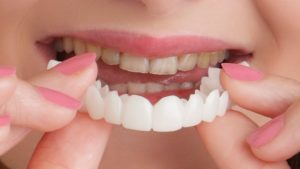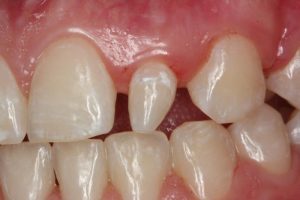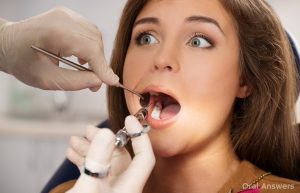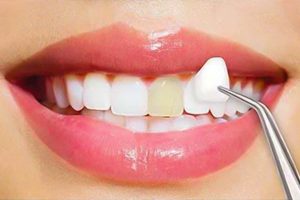My daughter has had two salivary gland infections and they are both on the same side where she had a root canal treatment done. Is it possible the root-canaled tooth is infecting her salivary gland?
Kerrie
Dear Kerrie,
I’m sorry about the ordeal your daughter has been facing. That must be painful. The first thing I would suggest is that you have some x-rays done for her tooth with the root canal treatment. For the salivary gland to get infected from the root canal, there would have to be an active infection in the tooth.
Root canal failure is fairly common so I wouldn’t be completely surprised if there was an active infection. You should be aware that the chances of a successful procedure go down with each root canal retreatment. If it turns out your daughter does have an active infection, you will have a better chance of success with the follow-up treatment if you go to an endodontist.
It isn’t a guarantee, but they specialize in these treatments and will have more experience. Don’t put off the re-treatment. These types of infections are considered dental emergencies.
When a Tooth Cannot Be Saved?
Sometimes, a tooth cannot be saved. When that happens, the tooth needs to be extracted and replaced. The best tooth replacement is a dental implant. You didn’t mention how old your daughter is. For her to get a dental implant, she would need to have a fully developed jaw. Until then, a temporary replacement (like a dental flipper) will keep the space open and will cost you less than other replacement options.
If the x-ray determines there is not an active infection, then whatever is going on with her salivary gland will have nothing to do with her dental health. I would suggest further investigation.
Salivary Gland Infection After Dental Work:
Salivary gland infection after dental work is somewhat common. They are also known as sialadenitis and can occasionally occur as a complication after dental work. These infections typically involve the major salivary glands, such as the parotid, submandibular, and sublingual glands. While salivary gland infections are relatively rare, certain dental procedures can contribute to their development.
Causes:
Salivary gland infections after dental work may arise due to various factors. Poor oral hygiene, dehydration, reduced saliva flow, and the presence of salivary duct stones can create an environment conducive to bacterial growth. Invasive dental procedures, particularly those involving the ductal system or causing trauma to the salivary glands, can increase the risk of infection.
Symptoms:
Common symptoms of salivary gland infections include localized swelling, pain, redness, and tenderness in the affected gland area. Patients may also experience difficulty opening their mouths, dry mouth, and a foul taste. In severe cases, systemic symptoms such as fever and malaise may be present.
Prevention:
Practicing good oral hygiene, staying adequately hydrated, and maintaining regular dental check-ups can help prevent salivary gland infections. Dentists should be informed of any pre-existing conditions, medications, or symptoms that may contribute to an increased risk of salivary gland issues.
Treatment:
Treatment for salivary gland infections often involves a combination of antibiotics to address the bacterial infection, along with measures to stimulate saliva flow, such as staying well-hydrated and using sour candies. Warm compresses and massage of the affected gland may also provide relief. In more severe cases or those with recurrent infections, further interventions such as sialography or drainage of abscesses may be necessary.
Seeking Prompt Dental Attention:
Many people wonder can tooth infection cause salivary gland infection.
Well, that’s technically true because sometimes tooth infections spread to your mouth and cause severe kinds of salivary gland infections.
So, what’s the solution?
If symptoms of a salivary gland infection arise after dental work, it is crucial to seek prompt dental attention. Dentists can evaluate the extent of the infection, prescribe appropriate medications, and recommend supportive measures to alleviate symptoms and prevent complications.
In conclusion, while salivary gland infections following dental work are uncommon, awareness of potential risk factors, timely dental care, and good oral hygiene practices can contribute to prevention. Patients should communicate any concerns or symptoms to their dentist, fostering a collaborative approach to maintain optimal oral health
Can Dental Work Damage Salivary Glands?
Yes, certain dental procedures and conditions can potentially lead to damage or issues with the salivary glands. Here are some factors to consider:
- Trauma During Dental Procedures: Certain dental treatments, especially those involving the lower jaw, may carry a risk of trauma to the salivary glands. For instance, dental extractions, implant placements, or surgeries near the salivary glands can inadvertently cause damage.
- Infections and Inflammation: Infections in the oral cavity, such as those in the teeth, gums, or nearby structures, can lead to salivary gland inflammation (sialadenitis). This inflammation may affect the normal functioning of the glands.
- Duct Obstruction: Salivary duct stones or other obstructions can prevent the proper drainage of saliva, leading to swelling and potential damage to the salivary glands.
- Radiation Therapy: Patients who undergo head and neck radiation therapy for cancer treatment may experience damage to the salivary glands, leading to reduced saliva production and a condition known as radiation-induced xerostomia.
- Sialography and Imaging Procedures: Certain diagnostic procedures, like sialography (an imaging test of the salivary glands), may carry a slight risk of causing damage to the glands.
It’s important to note that while these risks exist, dental professionals take precautions to minimize the likelihood of salivary gland damage during dental procedures. Additionally, the benefits of necessary dental treatments usually outweigh the potential risks.
If a patient experiences persistent symptoms such as swelling, pain, or dry mouth after dental work, it is crucial to report these symptoms to the dentist promptly.
Timely communication allows for a thorough evaluation, appropriate diagnosis, and effective management of any potential issues with the salivary glands.
Patients should inform their dentists about any pre-existing conditions or concerns related to their salivary glands before undergoing dental procedures.







